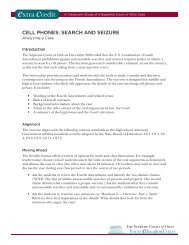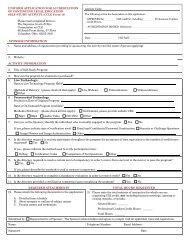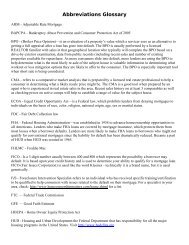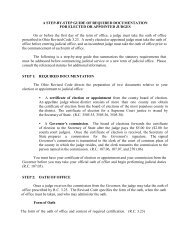Planning for Parenting Time: Ohio's Guide for Parents Living Apart
Planning for Parenting Time: Ohio's Guide for Parents Living Apart
Planning for Parenting Time: Ohio's Guide for Parents Living Apart
Create successful ePaper yourself
Turn your PDF publications into a flip-book with our unique Google optimized e-Paper software.
Child Development and Suggested <strong>Parenting</strong> Schedules<br />
TEENAGERS (13 TO 18 YEARS)<br />
The teenager is developing greater independence and beginning to<br />
separate from the family, including both parents. Teens start to feel like<br />
young adults who think they no longer need their parents, but also have<br />
times when they still want their parents to take care of them. They begin<br />
to plan <strong>for</strong> driving and dating, and they are thinking about college or<br />
work.<br />
<strong>Parents</strong> should let their teen<br />
express his or her views, while<br />
making it clear it is up to the<br />
parents to make the final<br />
parenting time decisions.<br />
They are feeling the pressures of school, family<br />
and friends, and they may not like a strict<br />
parenting time schedule. They may show their<br />
dissatisfaction by becoming irritable or moody or<br />
developing an attitude they never had be<strong>for</strong>e.<br />
Many lack the skills to express the many strong,<br />
but conflicting emotions that go along with<br />
growing up. When parents are establishing a<br />
parenting time schedule or considering making<br />
changes in an existing schedule, they should give<br />
thought to the needs and wishes of their teenager.<br />
<strong>Parents</strong> should let them express their views, while making it clear it is up<br />
to the parents to make the final decisions.<br />
During a separation or divorce, parents often feel the need to pull their<br />
teen closer to them to reassure themselves they are not losing their child<br />
to the other parent. Sometimes parents are tempted to get their child on<br />
their side. A teen may avoid both parents or reject one parent and cling to<br />
the other, especially if the parents are putting them in the middle of their<br />
conflict. Some teens want little or nothing to do with either parent and<br />
turn to friends or others to talk to who are not part of the conflict. Teens<br />
often are confused and angry at the way their parents act and may feel<br />
their parents have not been concerned about how the divorce or<br />
separation affects them. The strong conflicting emotions they experience<br />
may cause them to act in new and unfamiliar ways as they struggle to<br />
deal with these changes. There<strong>for</strong>e, parents should not assume that their<br />
child’s mood swings or acting out are caused by the other parent.<br />
47
















